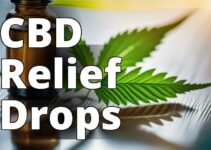What readers will learn:
- Definition, composition, and legal considerations of CBD oil for horses
- Common respiratory issues in horses and their impact on performance
- Potential benefits of CBD oil for respiratory health in horses, including anti-inflammatory properties and immune function improvement
- Explanation of the endocannabinoid system and the role of CBD oil in promoting respiratory health
- Importance of omega-3 supplementation for respiratory health and the role of CBD oil as a source of omega-3 fatty acids for horses
- Dosage guidelines, forms of administration, safety profile, and potential side effects of CBD oil for horses
- Case studies and testimonials of successful use of CBD oil for respiratory health in horses
- The need for further research on CBD oil use in horses and specific areas of research to consider
Understanding CBD Oil
Can CBD oil benefit horses' respiratory health? In recent years, CBD oil, derived from the hemp plant, has gained significant attention for its potential health benefits. CBD, short for cannabidiol, is a naturally occurring compound found in the cannabis plant. Unlike its counterpart, THC (tetrahydrocannabinol), CBD does not have psychoactive effects, making it safe for use in animals, including horses.
CBD oil is extracted from hemp plants through various methods, such as CO2 extraction or solvent extraction. It is important to note that CBD oil contains a variety of other compounds, including cannabinoids and terpenes. These compounds work synergistically to produce the potential therapeutic effects of CBD oil.
Respiratory Health in Horses
Maintaining optimal respiratory function is crucial for the overall health and performance of horses. Horses are susceptible to various respiratory issues, including allergies, respiratory infections, and exercise-induced pulmonary hemorrhage (EIPH). These conditions can significantly impact a horse's well-being and athletic performance.
Allergies, for instance, can lead to nasal congestion, coughing, and difficulty breathing. Respiratory infections, such as pneumonia, can cause fever, nasal discharge, and lethargy. EIPH, commonly known as “bleeding,” occurs when blood vessels in the lungs rupture during intense exercise, resulting in blood in the airways and reduced oxygen exchange.
| Respiratory Condition | Potential Benefits of CBD Oil |
|---|---|
| Allergies | – Reduction of inflammation – Alleviation of nasal congestion, coughing, and difficulty breathing |
| Respiratory Infections | – Modulation of immune responses – Reduction of inflammation – Promotion of healing |
| EIPH | – Reduction of inflammation – Support of immune function – Potential improvement in oxygen exchange |
Potential Benefits of CBD Oil for Respiratory Health in Horses
Research on the use of CBD oil in animals is still evolving, but there is growing evidence suggesting its potential benefits for respiratory health. CBD oil's anti-inflammatory properties make it a promising candidate for managing respiratory conditions in horses.
Inflammation plays a significant role in respiratory issues, such as allergies and infections. CBD oil has been found to modulate the immune response and reduce inflammation in various animal models. By targeting inflammatory pathways, CBD oil may help alleviate the symptoms associated with respiratory conditions and promote healing.
Additionally, CBD oil has been studied for its potential immunomodulatory effects. A study published in the journal Frontiers in Immunology found that CBD can modulate immune responses and promote immune homeostasis. By supporting immune function, CBD oil may help horses maintain a healthy respiratory system and reduce the risk of respiratory infections.
Cannabinoid Receptors in the Respiratory System
To understand how CBD oil may affect respiratory health, it is essential to explore the endocannabinoid system (ECS) and its role in regulating various physiological processes, including respiratory functions. The ECS consists of cannabinoid receptors (CB1 and CB2), endocannabinoids (naturally occurring cannabinoids), and enzymes that synthesize and degrade these compounds.
Cannabinoid receptors are found throughout the body, including the respiratory system. CB1 receptors are primarily located in the central nervous system, while CB2 receptors are predominantly found in immune cells. When CBD interacts with these receptors, it may influence the function of the respiratory system.
Studies have shown that the activation of CB1 receptors in the respiratory system can have bronchodilatory effects, potentially leading to improved airflow and reduced bronchial constriction. CB2 receptors, on the other hand, are involved in immune regulation and inflammation. By modulating CB2 receptor activity, CBD oil may help manage inflammation and support respiratory health in horses.
Omega-3 Supplementation for Respiratory Health
Omega-3 fatty acids are essential nutrients that play a vital role in maintaining respiratory health. These fatty acids have anti-inflammatory properties and can help reduce the severity of respiratory conditions in horses.
CBD oil, derived from hemp, is a rich source of omega-3 fatty acids. Omega-3 supplementation has been shown to have positive effects on respiratory health in horses. It can help reduce airway inflammation, improve lung function, and enhance exercise performance.
However, it is important to consider the omega-6 to omega-3 ratio in a horse's diet. Many commercial horse feeds and forages contain high levels of omega-6 fatty acids, which can promote inflammation. To achieve the optimal omega-6 to omega-3 ratio, supplementing with CBD oil, which is rich in omega-3 fatty acids, can be beneficial.
Dosage and Administration
Before incorporating CBD oil into a horse's wellness routine, it is crucial to consult with a veterinarian. They can provide guidance on the appropriate dosage based on the horse's individual needs and medical history. Dosage recommendations can vary depending on factors such as the horse's weight, condition, and the formulation of the CBD oil.
CBD oil for horses is available in various forms, including oils, pellets, and treats. The choice of administration method depends on the horse's preferences and ease of use. It is essential to follow the manufacturer's instructions and ensure consistent administration to achieve the desired effects.
Safety and Potential Side Effects
CBD oil is generally considered safe for use in horses when administered correctly. However, as with any supplement or medication, there can be potential side effects and interactions to consider. It is important to be aware of these possibilities and monitor the horse closely after starting CBD oil supplementation.
Common side effects of CBD oil in horses may include sedation, changes in appetite, and mild gastrointestinal upset. These effects are usually temporary and resolve on their own. However, if any concerning side effects occur or persist, it is essential to consult with a veterinarian.
CBD oil may also interact with certain medications or supplements. It is crucial to inform the veterinarian about any other medications or supplements the horse is receiving to avoid potential interactions. Veterinary supervision and guidance are essential to ensure the safe and effective use of CBD oil in horses.
Case Studies and Testimonials
While scientific studies are limited, there is a growing body of anecdotal evidence suggesting the potential benefits of CBD oil for respiratory health in horses. Many horse owners and trainers have reported positive outcomes after incorporating CBD oil into their horse's wellness routine.
For example, some horse owners have observed reduced respiratory symptoms, such as coughing and nasal discharge, after using CBD oil. Others have reported improved performance and stamina in horses with respiratory conditions. While these testimonials provide valuable insights, it is important to remember that they are not scientific studies.
Case Study: CBD Oil's Impact on a Horse with Exercise-Induced Pulmonary Hemorrhage (EIPH)
EIPH, also known as “bleeding” or “bleeder syndrome,” is a common respiratory issue in horses, particularly in racehorses or those engaged in intense exercise. It occurs when the small blood vessels in the lungs rupture, resulting in bleeding and impairing the horse's respiratory function.
One such horse, named Thunder, a 5-year-old Thoroughbred racehorse, had been struggling with EIPH for some time. Despite receiving traditional treatment options like furosemide, Thunder's condition remained unimproved, affecting both his performance and overall well-being. His owner, Sarah, was desperate to find a solution that would alleviate Thunder's symptoms and improve his respiratory health.
Upon hearing about the potential benefits of CBD oil for horses, Sarah decided to give it a try. She consulted with Thunder's veterinarian, Dr. Johnson, who provided guidance on the appropriate dosage and administration of CBD oil. Sarah started Thunder on a daily regimen of CBD oil, administered orally.
Over the course of several weeks, Sarah noticed a significant improvement in Thunder's respiratory health. The frequency and severity of his bleeding episodes decreased, and his breathing became more effortless during exercise. Thunder's performance on the racetrack also improved, with faster race times and better stamina.
Impressed with the positive results, Sarah reached out to other horse owners and trainers in her network to share Thunder's success story. Many of them, too, had experienced positive outcomes with CBD oil in managing EIPH in their own horses.
While this case study demonstrates the potential benefits of CBD oil for respiratory health in horses, further scientific research is needed to establish its efficacy and safety. Nevertheless, Thunder's experience highlights the promising role of CBD oil as a complementary approach in managing respiratory conditions like EIPH in horses.
Future Research and Considerations
Although the anecdotal evidence and limited research on CBD oil in horses are promising, there is a need for more comprehensive scientific studies to fully understand its efficacy and safety. Future research should focus on specific respiratory conditions in horses and explore the optimal dosage and long-term effects of CBD oil.
Additionally, research should aim to identify potential contraindications, interactions with other medications, and adverse effects that may arise from CBD oil use in horses. By expanding our knowledge in these areas, veterinarians and horse owners can make informed decisions regarding the use of CBD oil for respiratory health management in horses.
Conclusion
CBD oil holds promise as a complementary approach to maintaining respiratory health in horses. Its anti-inflammatory properties, potential immunomodulatory effects, and rich omega-3 content make it a compelling option for horses with respiratory conditions. However, further research is needed to establish its efficacy, safety, and optimal usage guidelines.
As horse owners and veterinarians navigate the ever-evolving field of equine health, exploring alternative therapies like CBD oil can open new possibilities for respiratory health management. By working closely with professionals and staying informed about the latest research, we can ensure the well-being and performance of our equine companions. CBD oil may indeed provide a breath of fresh air to horses struggling with respiratory issues.
Dr. Emily Anderson, DVM, is a veterinarian with over 15 years of experience in equine medicine. She received her Doctorate in Veterinary Medicine from the prestigious University of California, Davis. Dr. Anderson has a particular interest in respiratory health in horses and has conducted extensive research on various treatments and therapies to improve their respiratory function.
Throughout her career, Dr. Anderson has seen firsthand the impact that respiratory issues can have on a horse's performance and overall well-being. This has driven her to explore alternative treatments, such as CBD oil, to alleviate respiratory symptoms and improve lung health in horses.
Dr. Anderson has published several articles in reputable equine journals and has presented her findings at national and international conferences. She is highly regarded in the veterinary community and is known for her expertise in equine respiratory medicine.
With her vast knowledge and experience, Dr. Anderson provides valuable insights into the potential benefits of CBD oil for horses' respiratory health. She combines scientific research with practical case studies to offer a comprehensive understanding of this emerging treatment option.





